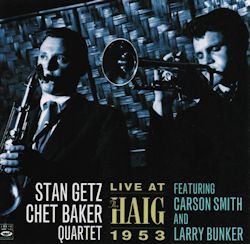1. Yardbird Suite
2. The Way You Look Tonight
3. Half Nelson
4. Move
5. Whatís New
6. Strike Up The Band
7. Come Out, Wherever You Are
8. All The Things You Are
9. Soft Shoe
10. Whispering
11. Yesterdays
12. Gone With The Wind
13. Bernieís Tune
14. Little Willie Leaps
15. Winter Wonderland
Stan Getz - Tenor sax
Chet Baker - Trumpet
Carson Smith - Bass
Larry Bunker - Drums
In the Spring of 1952, baritone saxophonist Gerry Mulligan secured a standing Monday night gig at a small club (85 seats) called The Haig, which was
located on Wilshire Blvd. in Los Angeles, California. At this point, he was playing with a rotating group of musicians out of which the eventual Gerry
Mulligan Quartet with Chet Baker was formed. Although there were several iterations of this group in the subsequent months, in early 1953 the band with
Mulligan/Baker, bassist Carson Smith and drummer Larry Bunker came into being. Through the spring and early summer of í53, this group gained fame and
recognition far beyond the confines of their resident club location at The Haig. However in June 1953, Mulligan ran into trouble with Californiaís narcotic
laws and was confined to the Sheriffís Honor Farm for a six-month period.
In order to fulfill the Quartetís commitment to The Haig, Mulligan suggested that Stan Getz be his replacement for the engagement. Hence, we have the
genesis of this recording. Now while Getz and Baker recorded together later in their careers, the end was in sight for the Mulligan/Baker band. Since
Mulligan was away for this six-month period, Chet Baker moved on to form his own quartet with pianist Russ Freeman, which also gained notable recognition.
As for Getz, although he was filling in for Mulligan, at the same time he had his own quintet with Bob Brookmeyer, Frank Isola, John Williams and Teddy
Kotick. That band began a gig at another Los Angeles jazz landmark, Zardiís, once Getz had finished at The Haig.
After that rather lengthy story to set the stage, now on to the music which unfortunately is less than the sum of the parts. The set list, all of which
came from the Mulligan/Baker band book, were Mulligan arrangements meant to exploit the fully developed gruff power of Mulliganís baritone sax, contrasted
against the sensitive expressive style of Bakerís trumpet. Getzís lighter lyrical tone did not offer the same dynamics.
There is some nice stuff here starting with Charlie Parkerís Yardbird Suite with the two leading principals fully engaged in the contrapuntal
voicing that gave the number its colour. Bassist Carson Smith has a strong solo and drummer Larry Bunker shares his drum breaks between Getz and Baker.
Miles Davisí Half Nelson is another bop piece done in sprightly style with Getz at the forefront showing his remarkable improvisational
chops. This seems to pick up Baker as he stretches his harmonic range. There is some dazzling spontaneous interplay between the two. Denzil Bestís Move gained some musical stature when it was included as part of the Miles Davis Birth Of The Cool album. Baker and Getz turn up the heat
in this rendition to burn through the track.
The band seems to fall apart for several numbers starting with All The Things You Are when Baker and Getz canít get coordinated on the theme and
seem to be playing different melodies in different keys. Getz goes off on tangent that has no relevance and has difficulty getting back to the theme.
Bakerís solo is full of clunkers and uncertain key changes. Mulliganís Soft Shoe is a bit of a mess with Getz dropping in quotes from Sweet And Lovely and some unaccustomed honking. Baker meanders around without purpose or interest. On Whispering, Baker falls
out without completing the melody. Getz tries to re-establish the theme, but sounds uncertain where he should take the tune. Baker returns but is off
centre and again falls victim to unpredictability. With the front line in disarray, it is left to bassist Smith to try to pick up the pieces and he does a
yeomanís job in an extended solo.
The final tracks are generally more consistent, with Bernieís Tune smartly rendered with Getz offering a clever solo that
demonstrates his expressive technique. Baker takes over and while he occasionally sounds tentative, he nevertheless delivers the goods. The final track Winter Wonderland is a bit of a mystery since the recording location is Los Angeles in the middle of summer. Although it swings along, it is
completely out of context and seems to be a throwaway number. Finally the quality of the recording is first rate despite the fact that it was a live club
recording done in 1953. However the original album was recorded by Dick Bock at Pacific Jazz Records so perhaps this outcome was to be expected.
Pierre Giroux
